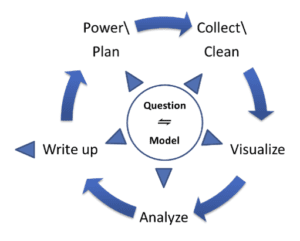Analyzing Intensive Longitudinal Data
Length: Five-Days
Instructors: Jean-Philippe Laurenceau & Niall Bolger
Software Considerations: Mplus, R, SPSS
Lifetime Access: No expirations
Student: $990
Professional: $1290
Analyzing Intensive Longitudinal Data is a five-day workshop devoted to the analysis and interpretation of data from studies involving many repeated measurements on individuals and dyads. These studies include experience sampling, daily diary, ecological momentary assessment and ambulatory psychophysiological studies. They allow researchers to understand people's thoughts, emotions, behaviors, and physiology in their natural contexts. Typically, they involve data collected over the course of hours, days, and weeks that can reveal life as it is actually lived and provide insights that are not possible using conventional experimental or survey research methods. Intensive longitudinal data, however, present data analytic challenges stemming from the multiple levels of analysis and temporal dependencies in the data. Extensions of multilevel or mixed-effects models for longitudinal data (e.g., multiple outcomes, lagged dependent variables as predictors, residual autocorrelation) can take account of these complexities, and the goal of the workshop is to provide training in their use.
Drawn from the presenters' 2013 Guilford Press book, Intensive Longitudinal Methods: An Introduction to Diary and Experience Sampling Research (www.intensivelongitudinal.com), course topics will include: (a) introduction and overview of intensive longitudinal methods and designs; (b) analyzing the time course of continuous outcomes; (c) analyzing within-person causal processes for continuous outcomes; (d) modeling dyadic intensive longitudinal data; (e) modeling the time course and causal processes for categorical outcomes; (f) psychometrics of intensive longitudinal data; (g) within-person statistical mediation; and (h) power analyses for intensive longitudinal designs. The workshop will consist of lectures and software demonstrations with example datasets. Software demonstrations will be conducted using Mplus, SPSS, and R.
Instructor
 Jean-Philippe Laurenceau, Ph.D.
Jean-Philippe Laurenceau, Ph.D.
Jean-Philippe Laurenceau, is the Unidel A. Gilchrist Sparks III Chair in the Social Sciences and Professor of Psychological & Brain Sciences at the University of Delaware where he teaches doctoral courses on regression analysis, multilevel modeling, structural equation modeling, and applied longitudinal data analysis. Read More
 Niall Bolger, Ph.D.
Niall Bolger, Ph.D.
Niall Bolger is Professor of Psychology and former Chairperson of the Department of Psychology at Columbia University where he teaches a graduate statistics sequence on linear and mixed models as tools for psychological research. He also teaches classes on research methods and psychophysiological methods and analysis. Read More
Workshop Details
Reviews
This workshop had so many strengths! I am so thankful for JP, Niall, and Ana [the teaching assistant] for all of their hard work. The material they covered is very difficult, but they explained it so well. I loved all of their examples, and I am so thankful for the lecture slides as well as the SPSS, R, and Mplus notes. Also, I think that JP, Niall, and Ana did a great job at answering questions both live and using the Q&A box.
Balances well the emphasis on theory and background of the topic and practical implementation. Approach is for researchers rather than statisticians (which I as a researcher really appreciate).
Niall and JP are experts in their field and they recognize the complexity of this analytical approach. They knew where to explain in more detail and paced themselves extremely well for us to follow along and ensure that we understood the concepts, methods, and approaches.
The panelists work hard to answer every question that is asked. The panelists were VERY knowledgeable and helpful! I was never made felt like I asked a dumb question.
The instruction style was clear, and I especially appreciated the way that the instructors provided software code and walked us through the sample code.
This was a great course - I would highly recommend to anyone analyzing intensive longitudinal data!
Quick Navigation
Self-Paced Workshops
Free Introduction to Structural Equation Modeling
Length: Three Days
Instructors: Dan Bauer & Patrick Curran
Lifetime Access: No expirations
Mixture Modeling and Latent Class Analysis
Length: Five Days
Instructors: Dan Bauer & Doug Steinley
Lifetime Access: No expirations
Applied Measurement Modeling
Length: Four Days
Instructors: Patrick Curran & Greg Hancock
Lifetime Access: No expirations
Causal Inference
Length: Five Days
Instructor: Doug Steinley
Lifetime Access: No expirations
Multilevel Modeling
Length: Five Days
Instructors: Dan Bauer & Patrick Curran
Lifetime Access: No expirations
Applied Qualitative Research
Length: Five Days
Instructors: Greg Guest & Emily Namey
Lifetime Access: No expirations
Modern Missing Data Analysis
Length: Three Days
Instructor: Craig Enders
Lifetime Access: No expirations
Machine Learning: Theory and Applications
Length: Five Days
Instructor: Doug Steinley
Lifetime Access: No expirations
Sample Size Planning for Power and Accuracy
Length: Three Days
Instructor: Samantha Anderson
Lifetime Access: No expirations
Network Analysis
Length: Five Days
Instructor: Doug Steinley
Lifetime Access: No expirations
Applied Research Design Using Mixed Methods
Length: Two Days
Instructor: Greg Guest
Lifetime Access: No expirations
Introduction to Data Visualization in R
Length: Four Days
Instructor: Michael Hallquist
Lifetime Access: No expirations
Longitudinal Structural Equation Modeling
Length: Five Days
Instructors: Dan Bauer & Patrick Curran
Lifetime Access: No expirations
Introduction to Quantitative Meta-Analysis
Length: Four Days
Instructor: Tasha Beretvas
Lifetime Access: No expirations


